★★★
“A heroine has no name.”
This is something of an obscurity. It’s available on YouTube, which is where I saw it, but I was unable to find an IMDb entry for it, or any other information beyond what is present at the source. It’s hard even to tell when it was made, because it’s a period piece, set (I’m going to presume) during the Japanese occupation of Manchuria in the 1930’s. We first meet the heroine (Yu) – who is never referred to as anything except “Guangdong Heroine” – as a schoolgirl, when her and a friend are attacked and raped by foreign soldiers. Unable to cope with the shame, her friend throws herself off the cliff, just before Ms. Heroine is rescued by the timely arrival of a group of rebels. She joins them, and rises up through the ranks, eventually taking over when their leader passes away, naming her as successor.
She becomes a leader of the resistance, famed throughout the province to the extent that various copycats take her name, while carrying out attacks on the occupying forces. But she has issues of her own, worrying that she is not feminine enough to attract the co-rebel for whom she has affection, the equally clunkily-named Tiger Four (Wei). The two eventually begin a relationship, but juggling romance and duty proves problematic. Things come to a head when a group of her soldiers rape a Japanese woman they took captive: Heroine has a zero-tolerance policy for such things and the perpetrators are sentenced to death. Which is awkward, since it eventually turns out that Tiger endorsed their actions. Justice therefore demands that he, too, suffer the same penalty. Will romance trump fairness?
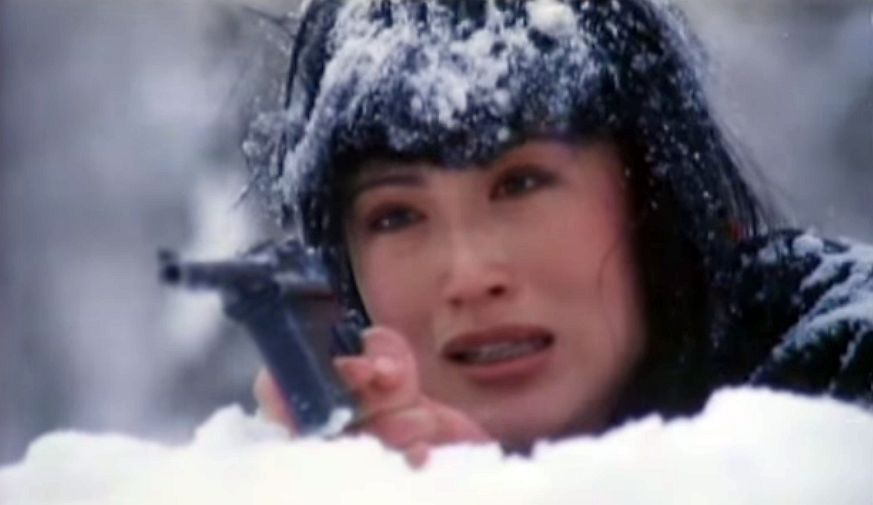
It’s a solidly-made item, though rather confusing. Heroine may have a sister who moonlights as a prostitute. She may also have another sister who is the daughter of a Japanese commanding officer. Or the film’s subtitles may simply be using “sister” in its meaning of Communist camaraderie, it’s hard to tell. The movie needs to be much clearer: it is certainly capable of this, such as when Heroine has her future told by a street fortune-teller. None of the vague “You will go on a journey and meet interesting people” nonsense here. He tells her: “The gap between your eyebrows shows death… In no more than half a month, you will be executed,” adding in a not very reassuring way, “Please don’t take offense. This is predetermined.” Chinese street fortune tellers clearly do not mess about.
Overall though, this is not bad, with some surprisingly epic battle scenes (I’m not sure the American Humane Society would agree, because some of the horse-falls look a little tough; there’s another scene early on which is also not going to impress PETA), and Yu has a steely determination about her that’s appealing. On the other hand, I would likely have been more interested in how she rises from violated schoolgirl, to become the heir apparent of a rebel clan, rather than what she does after she gets there.
Dir: Bai De-Zhang and Xu Xun-Xing
Star: Yu Lan, Lau Wei, Bai De-Zhang, Lisa Lu
[Update: I found the IMDb entry!] a.k.a. Guan dong da xia





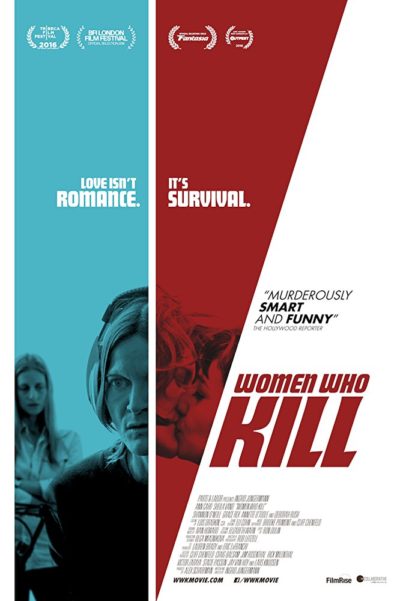 When I told Chris the title of this one, I swear you could hear her eyes rolling at the mere thought of it. But by the end, even she had to admit to having been won over by its dark charms. Most obviously is the sense of black humour which isn’t just dry, it’s as arid as the Atacama Desert. Morgan (Jungermann) and Jean (Carr) are fascinated by female serial killers, running a podcast on the topic which has acquired its own, unique fanbase. Morgan falls for Simone (Vand), a colleague at the food co-operative where she works. But Jean – who is also Morgan’s ex – can’t help thinking there is something seriously off with Simone.
When I told Chris the title of this one, I swear you could hear her eyes rolling at the mere thought of it. But by the end, even she had to admit to having been won over by its dark charms. Most obviously is the sense of black humour which isn’t just dry, it’s as arid as the Atacama Desert. Morgan (Jungermann) and Jean (Carr) are fascinated by female serial killers, running a podcast on the topic which has acquired its own, unique fanbase. Morgan falls for Simone (Vand), a colleague at the food co-operative where she works. But Jean – who is also Morgan’s ex – can’t help thinking there is something seriously off with Simone. Actually, if only this
Actually, if only this 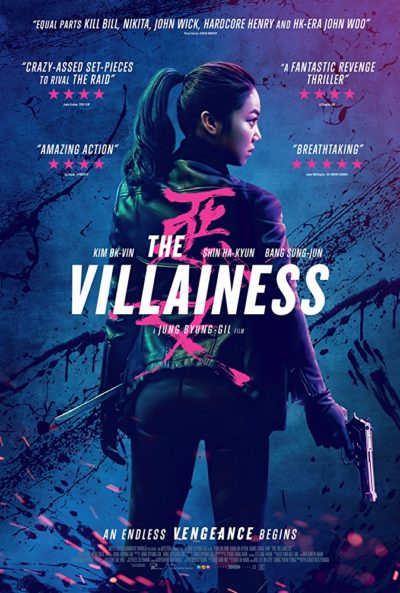 This opens with a blistering seven minutes of action which starts off in first-person perspective, looking like the most deranged video game ever, as the protagonist slices, dices and shoots their way through a building to a confrontation with the final boss. After being slammed head-first into a mirror, the point of view changes and we see the attacker is a young woman, Sook-hee (Kim Ok-bin). Finishing her slaughter, she calmly accepts arrest, but the Korean intelligence services recruit her, hoping to channel her skills to their own ends, after a spot of plastic surgery to ensure a fresh start. When training is completed, under Chief Kwon (Kim Seo-hyung), she’s given an apartment, unaware that the man next door, Jung Hyun-soo (Sung), is actually her handler. However, he’s not the only person with something to hide. Because Sook-hee is out to leverage her new position, and is still after long-awaited revenge on the man who killed her father.
This opens with a blistering seven minutes of action which starts off in first-person perspective, looking like the most deranged video game ever, as the protagonist slices, dices and shoots their way through a building to a confrontation with the final boss. After being slammed head-first into a mirror, the point of view changes and we see the attacker is a young woman, Sook-hee (Kim Ok-bin). Finishing her slaughter, she calmly accepts arrest, but the Korean intelligence services recruit her, hoping to channel her skills to their own ends, after a spot of plastic surgery to ensure a fresh start. When training is completed, under Chief Kwon (Kim Seo-hyung), she’s given an apartment, unaware that the man next door, Jung Hyun-soo (Sung), is actually her handler. However, he’s not the only person with something to hide. Because Sook-hee is out to leverage her new position, and is still after long-awaited revenge on the man who killed her father.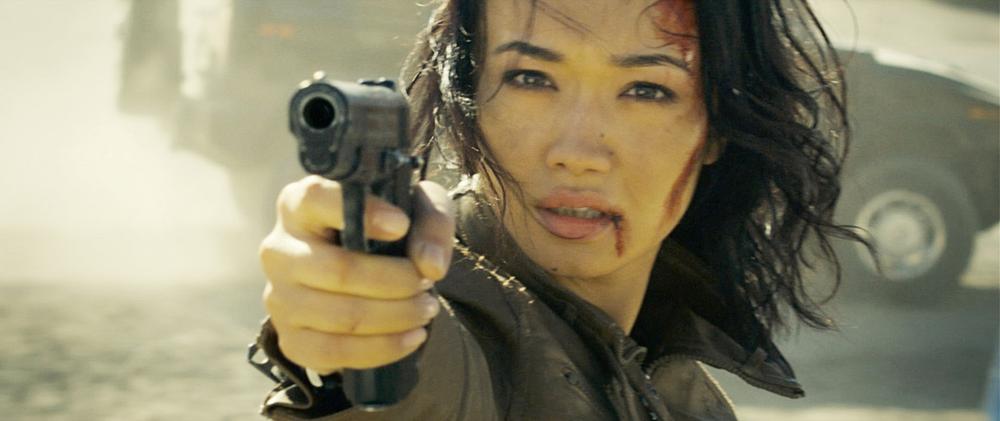
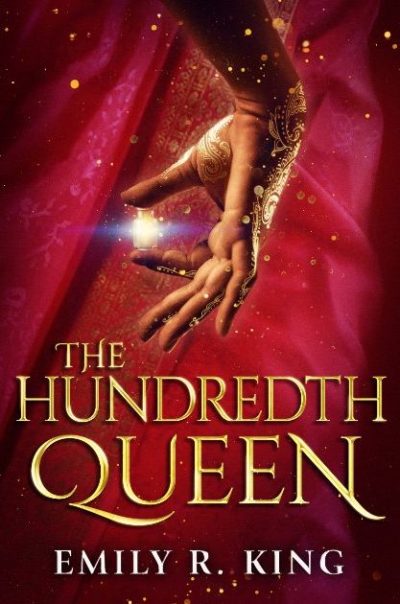 An interesting premise gets wasted, buried under a muddied writing style which sets up in one direction, then abandons it for another. Orphan Kalinda has been brought up by The Sisterhood in their remote temple in the mountains (kinda Indian, kinda Sumerian, annoyingly non-specific), training in the ways of a warrior – though others have far more talent in the era. Her life is upended when the local monarch, Tarek, visits the temple and selects Kalinda to be his next wife. Next, as in he already has 99, not to mention his additional courtesans. The problem for Kalinda is, this sets up a tournament in which she can be challenged by the other women, who seek to supplant her.
An interesting premise gets wasted, buried under a muddied writing style which sets up in one direction, then abandons it for another. Orphan Kalinda has been brought up by The Sisterhood in their remote temple in the mountains (kinda Indian, kinda Sumerian, annoyingly non-specific), training in the ways of a warrior – though others have far more talent in the era. Her life is upended when the local monarch, Tarek, visits the temple and selects Kalinda to be his next wife. Next, as in he already has 99, not to mention his additional courtesans. The problem for Kalinda is, this sets up a tournament in which she can be challenged by the other women, who seek to supplant her.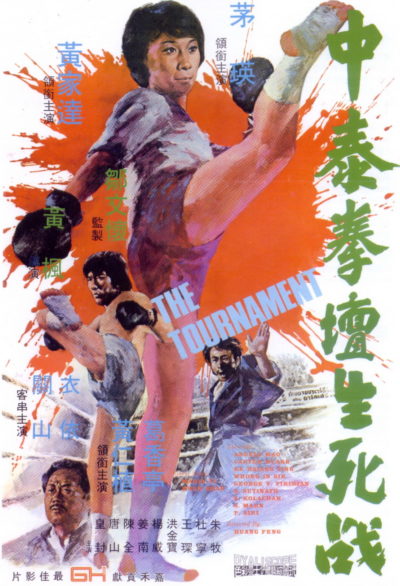 There’s a lot of chit-chat about face, honour and respect here. It begins when the master of a kung-fu school, Lau, has his daughter kidnapped by local hoodlums, after he won’t cough up protection money. Perhaps surprisingly, rather than using his skills to kick their arses, he sends two students to Thailand, including his son, Hong (Wong) in an effort to win the necessary funds. Hong loses, the other student is killed, and Lau is drummed out of the local Kung-Fu Association for having disgraced the name of Chinese martial arts by losing to foreigners. He’s so devastated, he hangs himself, leaving it up to his daughter, Siu Fung (Mao) to restore the family name, learn how to mesh Chinese kung-fu with Thai boxing, and rescue her sister. Quite the “to-do” list, I’d say.
There’s a lot of chit-chat about face, honour and respect here. It begins when the master of a kung-fu school, Lau, has his daughter kidnapped by local hoodlums, after he won’t cough up protection money. Perhaps surprisingly, rather than using his skills to kick their arses, he sends two students to Thailand, including his son, Hong (Wong) in an effort to win the necessary funds. Hong loses, the other student is killed, and Lau is drummed out of the local Kung-Fu Association for having disgraced the name of Chinese martial arts by losing to foreigners. He’s so devastated, he hangs himself, leaving it up to his daughter, Siu Fung (Mao) to restore the family name, learn how to mesh Chinese kung-fu with Thai boxing, and rescue her sister. Quite the “to-do” list, I’d say. Del Castillo is the undisputed queen of the action telenovela. She made her name as the original “Queen of the South” in one of the most popular entries ever,
Del Castillo is the undisputed queen of the action telenovela. She made her name as the original “Queen of the South” in one of the most popular entries ever, 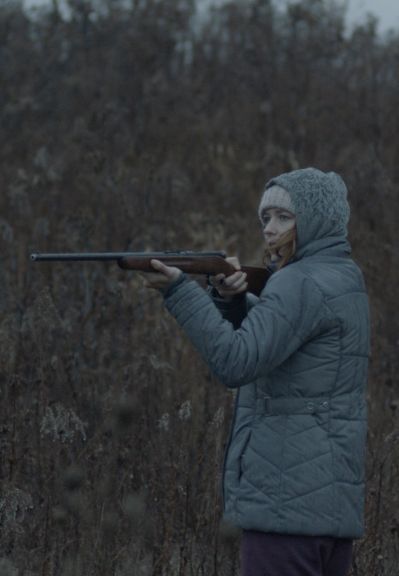 A viral plague has decimated mankind, turning its victims in mindless, flesh-craving ghouls. One of the few to have survived is Ann (Walters), who has taken up residence in the woods, where she has camped out. Ann uses the survival skills she received from her now-absent husband, Jason (West), only occasionally having to emerge and risk the threat of the infected, in order to gather supplies. Her secluded, yet relatively safe existence is disturbed, when she finds an injured man, Chris (Thompson) and his teenage daughter, Liv (Piersanti) on a road. They are supposed to be on their way north, to where the epidemic is reported to be in check. Yet Chris, in particular, seems curiously unwilling to be on his way.
A viral plague has decimated mankind, turning its victims in mindless, flesh-craving ghouls. One of the few to have survived is Ann (Walters), who has taken up residence in the woods, where she has camped out. Ann uses the survival skills she received from her now-absent husband, Jason (West), only occasionally having to emerge and risk the threat of the infected, in order to gather supplies. Her secluded, yet relatively safe existence is disturbed, when she finds an injured man, Chris (Thompson) and his teenage daughter, Liv (Piersanti) on a road. They are supposed to be on their way north, to where the epidemic is reported to be in check. Yet Chris, in particular, seems curiously unwilling to be on his way. Manami Toyota is perhaps the greatest wrestler you’ve never heard of – at least, unless you’ve an interest in the Japanese women’s version of the sport, known as joshi puroresu. There, she has been its almost undisputed queen for much of the past three decades. That covers the span from her debut on August 5, 1987, at the age of just 16, through to her farewell show which took place on November 3 in Yokohama’s Daisan Bashi Hall. She was in the vanguard of, and a significant force in, the joshi resurgence which took place during the mid-nineties, when women’s wrestling crossed over beyond its usual audience. That likely peaked with the Big Egg Wrestling Universe cross-promotion show at Tokyo Dome in November 1994. A crowd of more than thirty thousand attended the event, which ran for more than ten hours.
Manami Toyota is perhaps the greatest wrestler you’ve never heard of – at least, unless you’ve an interest in the Japanese women’s version of the sport, known as joshi puroresu. There, she has been its almost undisputed queen for much of the past three decades. That covers the span from her debut on August 5, 1987, at the age of just 16, through to her farewell show which took place on November 3 in Yokohama’s Daisan Bashi Hall. She was in the vanguard of, and a significant force in, the joshi resurgence which took place during the mid-nineties, when women’s wrestling crossed over beyond its usual audience. That likely peaked with the Big Egg Wrestling Universe cross-promotion show at Tokyo Dome in November 1994. A crowd of more than thirty thousand attended the event, which ran for more than ten hours.